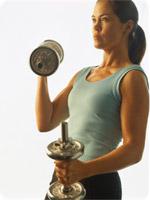- Fitness charts like the one mentioned earlier in this article developed by the researchers of the St. James Women Take Heart Project. It lets you see how your personal fitness level matches up with the fitness of other people your age.
- A home step test (loosely based on the Canadian Home Fitness Test) is another simple test that allows you to gauge fitness level. This test is designed to measure your cardiovascular endurance. Using a 12 inch high bench (or a similar sized stair in your house), step on and off for 3 minutes. Step up with one foot and then the other. Step down with one foot followed by the other foot. Try to maintain a steady four beat cycle. It's easy to maintain if you say "up, up, down, down". Go at a steady and consistent pace. At the end of 3 minutes, remain standing while you immediately check your heart rate by taking your pulse for one minute.
When you find a pulse, count the number of beats you feel within a one minute period. You should always use your fingers to take a pulse, not your thumb, particularly when recording someone else's pulse, as you can sometimes feel your own pulse through your thumb. - Fitness level check with a doctor. You can have your fitness level checked by your doctor at your next visit.
The best test and by far the most accurate is Health Reviser's Fitness Test.
Fitness Test. You simply plug in the USB pulse wave sensor to your computer, attach the ear-clip to your earlobe or a finger, sit down, relax and follow the simple instructions on your screen. Your physiological data is monitored in just 3 minutes. During the test you are prompted to stand up, which is needed to collect information on your body’s reaction to a physical action. Fitness Test Tool has a very sensitive device that monitors your body’s physiological response and the recovery time. Health Reviser then compares your results with thousands of people in order to give you a detailed report about your fitness level. The tool also records your data and allows you to track your progress day by day, week by week. The information you get can help you plan your fitness strategy according to your overall state of wellness on any given day, which helps prevent overtraining, undertraining and injuries. Fitness Test from Health Reviser is the fastest and most reliable fitness level calculation tool in the healthcare market today.
In conclusion:
An individual’s fitness level is much more important than most people realize. Pamela S. Douglas, MD, a Duke University researcher, says, "We doctors usually look at electrocardiograms [EKGs] and other tests to see heart trouble -- but it turns out how long you can exercise is almost as important. If you are well, how long you can exercise is more important than any other variable in determining how long you live." Douglas warns that many people who think of themselves as active are getting much less exercise than they need. That's why she says pedometers are a great idea. The devices measure how many steps you really take in a day.
One final note: According to the research done by Kramer et al. (1999), Chodozko-Zaijko (1991), Van Boxtel et al. (1997) and Etnier et al. (1997), physical fitness has a positive impact on cognitive performance. So not only does your physical health benefit from exercise, your brain does also.
References
- Chodozko-Zajko, Wojtek J. (1991). Physical fitness, cognitive performance, and aging. Medicine & Science in Sports & Exercise, 23(7),868-872.
- Etnier, Jennifer L., Salazar, Walter, Landers, Daniel M., Petruzzello, Steven J., Han, Myungwoo, & Nowell, Priscilla. (1997). The influence of physical fitness and exercise upon cognitive functioning: A meta-analysis. Journal of Sport & Exercise Psychology, 19(3), 249-277.
- Kramer, Arthur F., Hahn, Sowon, Cohen, Neal J., Banich, Marie T., McAuley, Edward, Harrison, Catherine R., Chason, Julie, Vakil, Eli, Bardell, Lynn, Boileau, Richard A., & Colcombe, Angela. (1999). Ageing, fitness and neurocognitive function. Nature, 400(6743), 418-419.
- Van Boxtel, Martin P. J., Paas, Fred G. W. C., Houx, Peter J., Adam, Jos J., Teeken, Joep C., & Jolles, Jellemer. (1997). Aerobic capacity and cognitive performance in a cross-sectional aging study. Medicine & Science in Sports & Exercise, 29(10), 1357-1365.








